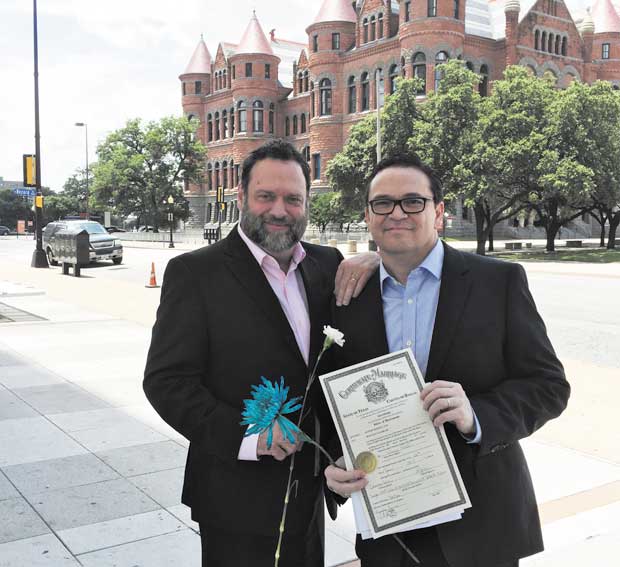After Legal Hospice of Texas got Jeff Cook’s retirement benefits reinstated, he and his husband found a way to say thank you

Jeff Cook, left, and Francisco Flores in front of the Allen Courts Building where they married on June 26, 2015.
DAVID TAFFET | Senior Staff Writer
“Legal Hospice of Texas gave me my life back,” Francisco Flores said.
Although LHT usually focusing on helping people with a terminal illness or HIV with their legal needs, Flores has neither. But his husband, Jeff Cook, was diagnosed with AIDS in 1990.
Cook and Flores lived in Houston where Cook worked for an airline and Flores worked as a hairdresser. In January 1990, they were both tested for HIV.
In 1989, Cook was taking a medication that he couldn’t miss. During the time, Houston was hit with a massive flood and he got stuck in his office without the drug. That resulted in his breaking out in shingles.
“Should I be tested,” he said he asked three different doctors. Each said no.
Finally, in 1990, they went to Montrose Clinic where Cook received his positive diagnosis. His doctor told him not to do anything about it for a year. Finally, he began taking AZT, the only drug available to treat to HIV at the time.
Flores was sure their time together was limited. At the time, most of his friends diagnosed with AIDS lived two years or less. He said when he received his negative diagnoses, clinic staff offered some “counseling” he wasn’t happy to hear: They told him he’d leave Cook soon, but Flores knew that was simply wasn’t going to happen.
And then there was the stigma. Flores told no one about Cook’s diagnosis, especially at the salon where he worked. “I couldn’t tell anyone because [the clients] would have stopped coming,” he said.
Flores said he found that ironic, since many of the other hairdressers at the salon were positive and some had already died of AIDS. But as long as they didn’t talk about it, customers kept coming.
In June 1994, Cook the airline transferred to Dallas. In September that year, he was forced to retire. “I had people tell me, ‘This is a Christian company,’” he recalled. Ironically, from the time Cook was diagnosed until the day he was forced out of the company, he never took a day off. So while he was having some medical problems and was losing weight, it didn’t affect his work.
 Cook received retirement pay and benefits from his company, while Flores continued to work. Still, Cook was afraid that if anything happened to him, his family might challenge his will and try to take away the house he shared with Flores. He wanted to give his partner something that couldn’t be taken away.
Cook received retirement pay and benefits from his company, while Flores continued to work. Still, Cook was afraid that if anything happened to him, his family might challenge his will and try to take away the house he shared with Flores. He wanted to give his partner something that couldn’t be taken away.Flores had earned an associate’s degree in Houston. After moving to Dallas, Cook encouraged him to enroll at University of North Texas. Flores did, earning his bachelor’s degree from the Denton school. It was a gift, Flores said, that “his family couldn’t take away.”
Their life in Dallas was going well. Cook was retired and Flores had begun working in the fashion industry.
Cook continued to receive his health benefits through the airline and HIV medications were expensive.
Then came the terrorist attacks of Sept. 11, 2001. The airline industry was hit hard, and airlines were suddenly looking to cut expenses. Cook’s benefits turned out to be one of those expenses.
“They sent me to a doctor in Fort Worth who was afraid to touch me,” Cook recalled.
He was sent to a psychiatrist. Ironically, he had seen that doctor a year earlier and he told Cook he was taking the right steps to manage his illness. This time, on the payroll of the airline, he reported there was nothing wrong with him.
And since nothing was wrong, the airline was able to cut his benefits.
“That was the equivalent of being fired,” Cook said.
For a year, the couple struggled to pay for COBRA insurance coverage. Cook qualified for disability with the federal government, which helped but didn’t cover all his healthcare costs. The men found themselves facing a frightening future.
“We didn’t know what to do,” Cook said.
“You don’t think you have legal rights,” Flores said. “We had friends who lost their cars, lost their houses.”
To help maintain his health, Cook attended Immunocize classes at Resource Center. Someone there told him about Legal Hospice Texas. So he called the office and spoke to Pete Flores, client services director for the agency.
“We can help,” Pete Flores promised, setting an appointment.
LHT staff attorney Joel Lazarine collected Cook’s medical records — a stack he said that was thick as a phone book — and went through every word, Cook said. And although the case took a year, the airline was required to make all back payments for lost pay and Cook maintains his retirement pay through today.
After the case settled, Pete Flores called Francisco Flores and mentioned a fashion show fundraiser for Legal Hospice that was being held at the Belmont Hotel. “As a way to say thank you,” Francisco Flores said, “I went and did hair and make-up.” But the show, Francisco Flores added, was a mess: models were jumping in the hotel’s pool and it all seemed more like a porn show than a fashion show.
So he told Roger Wedell, then the Legal Hospice’s executive director: “If you want a fashion show, we’ll do a fashion show.” It wasn’t long before Wedell called him back with the go-ahead.
That first fashion show featured celebrity models, including Sheriff Lupe Valdez wearing pink pajamas. Francisco Flores said he knew he was in it for the long haul when Wedell described the event as the “first annual.”
This year FashionCited’s marks its 10th anniversary. The event has gone from being staged on a small runway set up in an Oak Cliff restaurant to a runway at the Frontiers of Flight Museum. This year’s show features the work of 19 designers and professional models from the Campbell and Clutts agencies.
Model moms fight to get their kids in the show. El Centro College sends dressers from its fashion program to support the event. Lawyers of Style, who support the work of LHT by relieving its two staff attorneys of some of the agency’s cases, and area fashion companies volunteer for the event as well as buying tables to support the work.
Francisco Flores said producing the event each year has gotten easier, even though it’s grown larger and more complicated. He said he takes the time to arrange the clothing for each model and post storyboards so each model knows how much time there is for costume changes. That results in everyone having fun at the event, he said.
And Cook said he says thank you to LHT for what they did for him by volunteering in the office once a week.
Today, Cook continues to have chronic medical problems as a result of his AIDS diagnosis. But after 30 years together, he and Francisco Flores were married the day of the Supreme Court’s marriage equality decision and no longer fear anyone from either family ever taking anything away from them.
This article appeared in the Dallas Voice print edition April 22, 2016.

